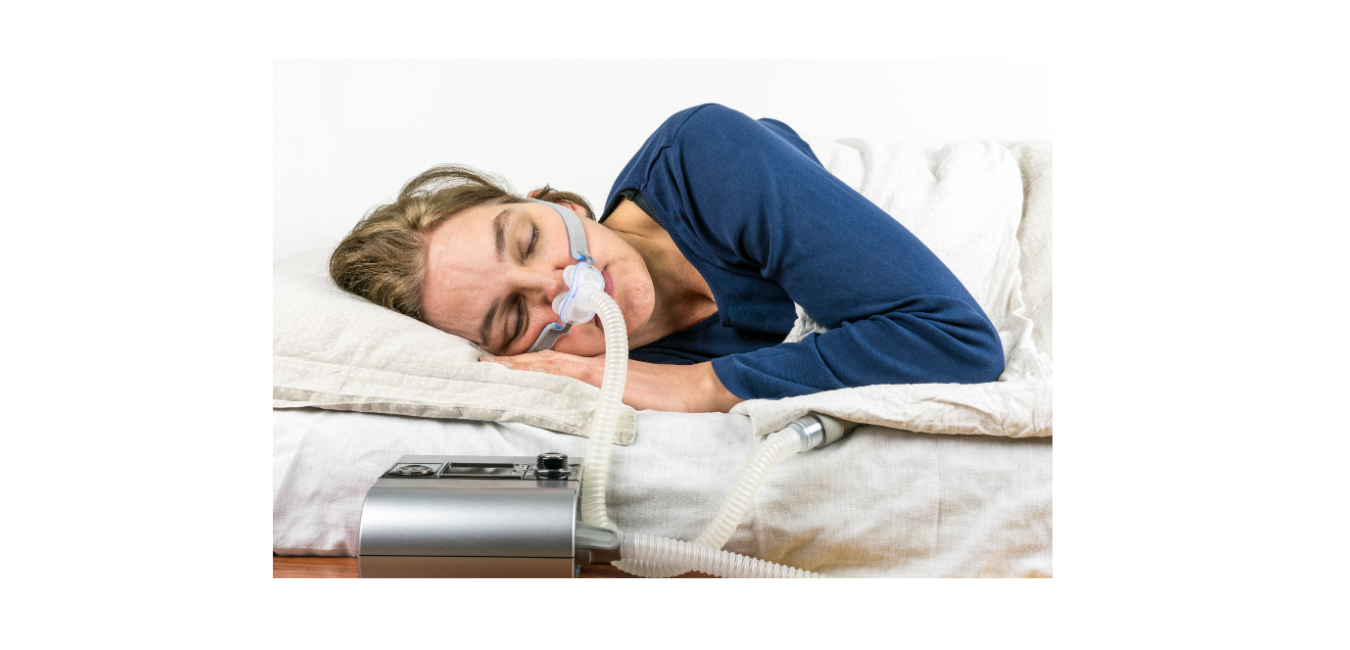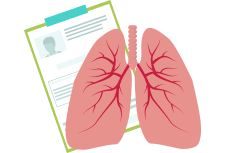What is sleep apnoea?
Obstructive sleep apnoea (OSA) is a condition where by your upper airway/throat area can be prone to get blocked when you’re asleep. We all do it to a minor degree but as it gets more frequent it becomes abnormal i.e. five times or more per hour of sleep. If your upper airway starts getting blocked, the flow of air into your lungs may cause vibrations, as air tries to pass through your upper airway. This is what causes snoring.
This reduction in airflow results in shallow breaths (hypopnoeas) and/or complete stopping of breathing (apnoeas). During sleep, your body still needs oxygen so if you’re not breathing then your oxygen level will fall. However, your brain is really good at sensing any reduction in oxygen levels and so it wakes you up a little bit so that your breathing gets going again. Perhaps you make a gasp or choking noise at night? This noise is caused by your upper airway waking up and opening up again. Sometimes this can wake you up fully, like you are now reading this, but sometimes you just move from a deep sleep to a lighter sleep but the important thing is that your sleep gets disrupted.
It’s this repetitive waking up that fragments your sleep and leads to other symptoms that can make you feel like you’ve slept badly.

Is my snoring caused by sleep apnoea?
It’s very common that people like you come to see a specialist like me because your partner has mentioned your snoring. Are you waking up your household with your loud snoring? Have you been kicked out of the bedroom and onto the sofa or into the spare room? Many people are embarrassed about it but there’s no need – I can help you. A typical pattern may be snoring followed by a gap of no breathing and then a gasp/choke as you’re breathing gets going again. This pattern occurs repeatedly overnight.
However, although snoring is a common symptom of sleep apnoea, it’s important to recognise that your snoring might because by things other than sleep apnoea such as nose or tonsil problems. Therefore, I work closely with ear, nose and throat (ENT) specialists in a holistic manner so that the cause of your snoring is diagnosed accurately and rapidly so that treatment, if appropriate, is started as soon as possible.
Are there other symptoms of sleep apnoea?
The answer is yes. Perhaps you snore but don’t know if you have apnoeas at night. You might find that you’re having to get up at night to use the bathroom or that your sex drive has reduced. Do you wake up in the morning feeling like you need to go back to bed? You might feel that your brain is foggy in the morning or you have a headache. Do you feel sleepy during the day? Has your mood taken a tumble? These are all symptoms that could point towards a diagnosis of OSA.
Sleepiness and tiredness
You might think that these are the same thing but they’re not. Sleepiness is the tendency to fall asleep because of inadequate sleep whereas tiredness is more a feeling of exhaustion where you may not actually fall asleep inappropriately. Have you fallen asleep at work or do you feel the need to power nap in the afternoon?
See how sleepy you are by filling in this quick questionnaire (Insert Epworth sleepiness score).
What did you score? It’s important to recognise that this score is a reflection of how sleepy you feel and it doesn’t make or break a diagnosis of OSA.
- Normal 10 or less.
- Mild 11-14
- Moderate 15-18
- Severe greater than 18
If you have a partner, it’s a really good idea to ask them to score you on your sleepiness too. Does your score match the score of your partner? Don’t be worried if your partner thinks you are more sleepy than you thought. We can all be prone to underestimate our own sleepiness levels.
I’m concerned I’ve got sleep apnoea: what should I do?
If you’re worried about OSA then book an appointment to see me and I can help you with both diagnosis and treatment. In preparation for your consultation with me it’s very helpful for me to know your: medical history, especially if you have had thyroid or blood pressure problems; any medications that you’re taking, as some medications such as antidepressants or treatment for anxiety can affect sleep; your height and weight, as some people with OSA may be overweight but not everyone.
What will happen at the consultation?
At your consultation with me I will take a detailed medical history from you and examine your chest and neck. I will ask you questions about your sleep patterns and your approach to going to sleep. I may check your oxygen level and your lung capacity by asking you to put something on your finger and get you to blow into machine. I shall then organise a sleep study for you.
What a sleep study?
A sleep study is a simple test that is performed overnight in your own home. On the day of your test, well ask you to come to the hospital so that you can be shown how to put the equipment on – it’s really easy, don’t worry. Once you’re happy you know how to put the equipment on, you take it home and use it that night. The next morning you bring the equipment back to the hospital and the sleep physiologist will send the information to me for analysis. You and I will then have a follow-up consultation to go through the results and plan any treatment, if required.
Why do I need treatment?
Aside from any social disruption due to your snoring, it’s very important to treat your sleep apnoea, as treatment can transform your sleepy daytimes and help to reduce blood pressure and thus reduce your risk of heart attacks and strokes. Many people like you have told me over the years that they feel like they are alive again and didn’t realise how sleepy they were beforehand. Before treatment people have told me that they felt like a zombie.
How do you treat sleep apnoea?
You and I will look at all aspects of treatment that could help improve your sleep. This may include: weight reduction if appropriate; quitting smoking; reducing alcohol intake; improving sleep opportunity (it’s no good going to bed at 1 a.m. and getting up at 6 a.m.); improving your sleep hygiene (this isn’t about cleanliness but more to do with developing good habits regarding going to sleep); and treatment of any underlying medical problems that you might have. These measures are generally called ‘conservative’ measures.
In addition to conservative measures, you might need to treatment with CPAP (continuous positive airway pressure). There are three components to CPAP:
- A small machine that provides some blowing pressure (the reverse of a vacuum cleaner).
- A mask to wear on your nose/mouth, referred to as an interface.
- Some tubing to connect the two parts together.
It’s vital that CPAP is started by and supervised by a sleep specialist like me. I work with excellent sleep physiologists who are very experienced in setting up CPAP for people like you. It might sound worse than it is but most people get used to CPAP very quickly and their lives can be transformed. There isn’t usually any problem that we haven’t seen before and can’t sort out.
Are there treatments other than CPAP?
It may be that you don’t fancy CPAP or can’t tolerate it. If you experience sleep apnoea when supine (sleeping on your back), then it may be appropriate for you to try a positional trainer device that helps you to not sleep on your back. Historically, people may have sewn a tennis ball into the back of their pyjama top so that it was uncomfortable to sleep on their back and they would then roll over onto their side without waking up. You might potentially benefit from a dental appliance to help keep your lower jaw/tongue from relaxing too far back and squashing your upper airway/throat. I also work with a specialist dental sleep team who can provide dental appliances, if required.
What now?
If any of the above sounds like you, then you’re in good company. Roughly 1 in 20 middle aged men (a bit less for women) have sleep apnoea, so it is very common. Help is available and I take great pride helping people like you get back to restful sleep and improving your quality of life.
If you want to see what other patients think about my approach and treatment, click here to read their feedback.
So, what are you waiting for? Give me a call or send me an email and let’s get you a good night’s sleep.

